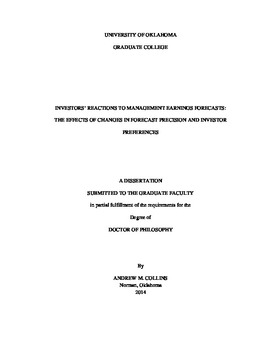Investors' Reactions to Management Earnings Forecasts: The Effects of Changes in Forecast Precision and Investor Preferences
Abstract
This study examines the effects of changes in management earnings forecast precision (i.e., changes in the width of the forecast range) and investor preferences on investor judgments. In general, prior research finds that more precise management forecasts are more credible than less precise management forecasts (e.g., Baginski et al. 1993). Nevertheless, when economic uncertainty is high, investors do not prefer very precise forecasts over less precise forecasts (Du et al. 2011). Based on the concept of credibility from Mercer (2005) and motivated reasoning theory from Kunda (1990), I predict that investors’ reactions to changes in forecast specificity will be based on their preferences for firm performance. Specifically, I predict that investors holding a long position will judge management to be more competent when the forecast range narrows, but more trustworthy when the forecast range widens. In contrast, I predict that investors holding a short position will judge management to be less trustworthy when the forecast range narrows, but less competent when the forecast range widens. I use an experiment to test these predictions. While results do not support the predictions above, I do find evidence that: (1) changes in forecast specificity affect investors’ judgments of economic uncertainty, and (2) investors’ perceptions of managerial trustworthiness and competence have predictable consequences for firm management. Specifically, in regard to the former, I find that investors perceive the greatest increase in economic uncertainty when holding a long position and the forecast range widens; conversely, I find that investors perceive a decrease in economic uncertainty when holding a short position and the forecast range narrows. In regard to the consequences of managerial credibility, I find investors’ belief that the manager is manipulating earnings is decreasing in perceived managerial trustworthiness. In addition, I find that investors’ willingness to retain the CEO is increasing in perceived managerial competence, but, after controlling for perceived managerial competence, investors’ decision to retain the CEO is not reliably related to perceived managerial trustworthiness.
Collections
- OU - Dissertations [9426]
